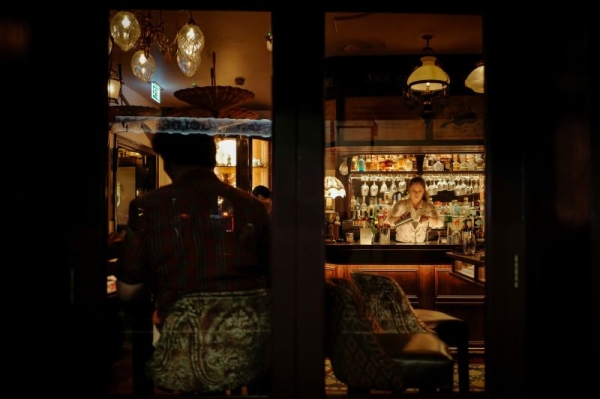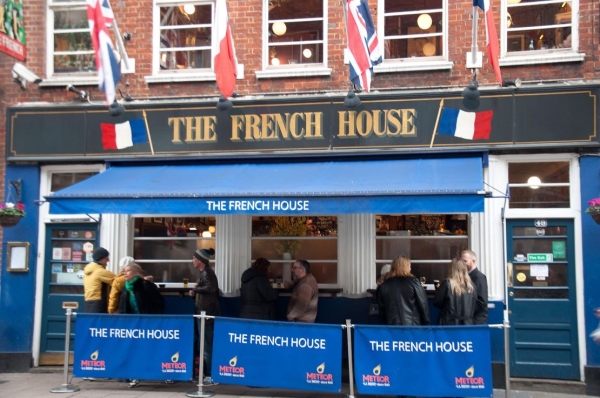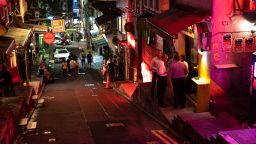
It’s Thursday, 11.00 p.m., and on a street in London’s Soho district, there’s a loud clatter. Staff are closing the windows in The French House, one of the city’s most popular pubs.
Lesley Lewis, its owner of 35 years, says she would like to stay open later, but her staff would have trouble getting home as there are few transport options. And her patrons aren’t drinking as much as they used to.
“People haven’t got the money,” she told CNN.
It’s a problem shared by many other pubs, bars and nightclubs in some of the world’s biggest cities since the coronavirus pandemic plunged them into crisis four years ago.
In London, a cost-of-living crisis that forced people to spend less or simply stay at home has collided with rocketing rents, energy bills and wages, vaporizing profit margins for hospitality businesses and pushing many past the point of no return.
Since March 2020, more than 3,000 night-time venues have shut down across Britain’s capital and its outskirts, according to the Night Time Industries Association. That’s a decline of 15% compared with the pre-pandemic number, and the steepest fall for any region of the country apart from Wales.
Michael Kill, the trade body’s chief executive, says the average operating costs for such businesses have shot up 30% to 40% in that time, while fewer customers are walking through their doors.
Unhappily for bars and pubs reliant on catching office workers for end-of-day drinks, huge chunks of their clientele continue to work part of the week from home, he told CNN. Meanwhile, the lack of late-night transport links and concerns about crime are deterring many people from visiting clubs.

Previously known as the York Minister, the French House is a pub and dining room in Soho, London, seen here in February 2024. Grazyna Bonati / Alamy Stock Pho/https://www.alamy.com/Alamy Stock Photo
About 70% of venues are either losing money or “barely breaking even,” Kill said, with some business owners deciding “to close early because they just can’t see the benefits of remaining open.”
Kill reminisced about his time in London 20 years ago when he would bounce from club to club in the early hours of the morning. “That just doesn’t happen anymore,” he said.
These days, there are fewer people sticking around for last orders — their last chance to buy a drink before the bar shuts — and that’s dulling the city’s spirit. On a Friday in March, Kill’s team went for drinks in Hoxton, a trendy enclave in London’s east, only to find their evening cut short when everything shut around midnight.
“It wasn’t as busy and vibrant, it wasn’t as hustle-bustle as you would expect for London.”
Zooming rent
Just after the pandemic, business was booming for Jeremy Joseph, owner of London’s renowned Heaven nightclub, a 45-year-old LGBT venue once frequented by Freddie Mercury.
But by January 2023, after more than a year of soaring inflation, partly driven by rising energy costs, he noticed his clubbers were spending “dramatically” less on drinks. “That’s when their bills started coming through, the first heating bills from the winter,” he told CNN. “People could notice the change in their lives.”
Joseph said his customers were increasingly “pre-loading” — drinking alcohol at home before heading out — to save money. “Whereas, before, people would come out and have a night out in a bar, then a club, they’re (now) going to supermarkets, getting cheap alcohol, pre-loading and then coming to clubs.”
“Our competition now (are) supermarkets, not necessarily other venues.”
At the same time, Joseph’s operating costs have ballooned. He is fighting a decision by Heaven’s landlord to raise his rent by £240,000 a year ($303,000), on top of an £80,000 ($101,000) increase imposed in September. “It’s insane,” he said.
‘Devastating’
Three miles to the east, in a warehouse big enough to fit 1,600 people, the cost of staging one of its popular techno, house, or drum and bass club nights has tripled since the start of the pandemic.
Jack Henry, the operations director for the E1 nightclub, says the venue’s monthly rent has jumped by 45% in the past year. And he, too, has noticed a striking drop in the amount customers are spending on drinks.
The pressures mean Henry can only budget from one week to the next. “It is very tight,” he told CNN. “You definitely do not go into nightclubs these days to make a quick buck… there are far easier ways to make money.”
Further east still, in the German capital Berlin, eye-watering energy bills and rises in other costs coincided last year with a drop-off in pandemic-era government aid for clubs, according to Lutz Leichsenring, an executive board member of Clubcommission, a non-profit advocating for the industry.

A DJ spins at Berlin club Re:mise. Fabian Sommer/picture alliance/Getty Images
That made last summer a “devastating” disappointment for the city, a clubbing hotspot, he said, though it is starting to recover.
A lot is at stake. Berlin’s techno scene is a big draw for companies trying to attract talent to a city Leichsenring believes is lacking in some conventional crowd-pleasers. “Berlin doesn’t have a harbor. We don’t have a beach. We’re not very pretty,” he said.
Underscoring its importance, last month the city’s techno scene was recognized by the German Commission for UNESCO as part of the country’s “intangible cultural heritage,” a move that could eventually lead to its inclusion on the United Nations body’s global list.
Clamping down
Many of London’s late-night spots have also struggled against a post-pandemic shift in attitudes among their neighbors. “Residents who live nearby to a venue had almost two years of peace and quiet, of no noise,” said Henry at E1.
Now, he said, complaints from residents are more likely to result in local authorities forcing a venue to close earlier, or to shut completely. That leaves many owners feeling like a “criminal,” rather than a vital contributor to the city’s culture and economy, Henry added.

People stand outside a bar along a near empty street at night in Hong Kong, China, on October 5, 2023. Noemi Cassanelli/CNN
London accounted for a third of the revenues of Britain’s hospitality industry last year, bringing in £46 billion ($58 billion), according to trade body UKHospitality.
In 2016, as one of his first measures in office, London Mayor Sadiq Khan appointed Amy Lamé as the city’s first-ever “Night Czar” in charge of protecting night-time venues.
Even before the ravages of the pandemic, the number of London’s nightlife venues was in steady decline. According to the Office for National Statistics, there were 7% fewer bars and pubs in the capital, and 16% fewer clubs, in 2016 than in 2010, when the ONS started collecting the data.
According to a spokesperson for City Hall, Lamé is unable to comment before the mayoral elections next month. A Labour Party spokesperson for the mayor told CNN that both Khan and Lamé “continue to work closely with businesses, venues, (and) boroughs” grappling with challenges ranging from high rents and business taxes to staff shortages.
A spokesperson for the UK government said it was supporting the night-time economy through a freeze on an alcohol tax, and by extending a 75% discount on property taxes for businesses in the hospitality sector.
‘Collective trauma’
Beyond simple economics, night-time venues are contending with changes in the way people socialize post-pandemic.
Charlie Fenemer, a DJ and organizer of jazz music events in London, has noticed Londoners becoming “a lot more picky” about how they party these days. “People choose to go out to specific events that they’re really excited about. They don’t just go out for the sake of going out now,” she told CNN.
It’s not just Europe’s biggest cities that are suffering.
In Hong Kong, too, businesses are trying to adapt to a new landscape. Becky Lam, a co-owner of Shady Acres, a bar in that city’s buzzing Soho district, said it was a slow, uphill battle to lure patrons back to bars after work.
“We used to see really bustling weeknights — Monday nights, Tuesday nights. Hong Kong was known as the city that never sleeps,” she told CNN. “We are not quite seeing that (return) to pre-pandemic levels yet.”
Scores of locals and expatriates who once frequented Hong Kong’s bars and clubs have left in recent years as Beijing has curtailed the city’s freedoms, and as draconian restrictions during the pandemic made life difficult.
For Lam, who part-owns another seven venues in the city, including a live music and cocktail bar, high rental costs and problems finding the right staff add to the pandemic’s lingering impact.
“There’s a little bit of collective trauma,” she said. “We got used to three and a half years of just not going out.”
Chris Lau in Hong Kong contributed reporting.

